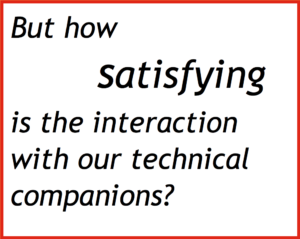The Affective Computing Group (ACG) is an interdisciplinary team researching Social Human-Computer Interaction in various projects. The ACG is part of the Cognitive Assistants (COS) department of the German Research Center for Artificial Intelligence (DFKI). We believe that satisfying social interaction with technical devices should follow the principles of Human-Human interaction. Within that context, we focus on modeling human emotions, communication of emotions, behavioral patterns, as well as social norms and values.
Motivation
In our private and professional daily life, we more and more rely on technical solutions. Applications implement algorithmic concepts that help us in realizing various tasks. Intelligent assistants start to be a part of our society and provide us with useful interactive solutions. The more such systems are integrated into our social life, the more social and satisfying they should be.

A satisfying social human-computer-interaction has to be based on the principles of human-human-interaction :
We have to teach the computer about human emotions and behavioral patterns as well as social norms and values!
In our research and projects, we focus on analyzing human-computer-interaction versus human-human-interaction.
What are the similarities? What are the differences?
How to bring an interaction with a computer closer to what we are used to from interactions with humans?
To answer these questions, we integrate scientific principles, results, and theories from both the field of psychology and computer science.
Our interdisciplinary team lead by Patrick Gebhard consists of professionals from the fields of psychology and computer science. Quality of our highly interdisciplinary work is based on strict methodological standards.
The close cooperation with our partners takes our work to a practical level and is already being used successfully due to our user-oriented approach. Our location at the German Research Center for Artificial Intelligence (DFKI) in Saarbrücken gives us access to a wide network of methods and techniques of artificial intelligence.
The two research areas – psychology and computer science – holds the potential to produce results yet undiscovered and unknown to the scientific community. But our work is not exclusively of interest to the scientific community – it is of relevance to everybody that is interested in the development and future aspirations in Affective Computing.
Come and take a closer look at our work!
Our Work
Our work is based on the union of psychology and computer science.
To create a natural user experience during the interaction with a computer, we incorporate theories and models of human cognition, affection and behavior.
We have to take into account the following questions:
how is the computer and the interaction with it perceived and processed by the user,
which behavioral patterns make an interaction natural and believable,
which emotions are hidden behind visual behavior,
which norms and values occur in a human-computer-interaction,
…
In practical projects we utilize these theories and models to improve the interaction with computers and create useful future-oriented tools.
For example:
TARDIS allows disadvantaged youths to improve their social skills.
EmpaT realizes a virtual job trainer with real-time affect model and social signal interpretation.
Our methodological approach makes use of scientific research methods such as randomized experiments, questionnaires and interviews. Our studies are designed, conducted, evaluated and reported objectively by a team of professionals.
The work also includes the development and use of specialized software to implement our ideas and projects.
For example:
Visual SceneMaker supports the modeling of behavior of virtual characters and robots.
ALMA provides real-time affect simulation of virtual characters.
Interdisciplinary cooperations and our location at the German Research Center for Artificial Intelligence ensure our work to result in high-quality innovative products.
